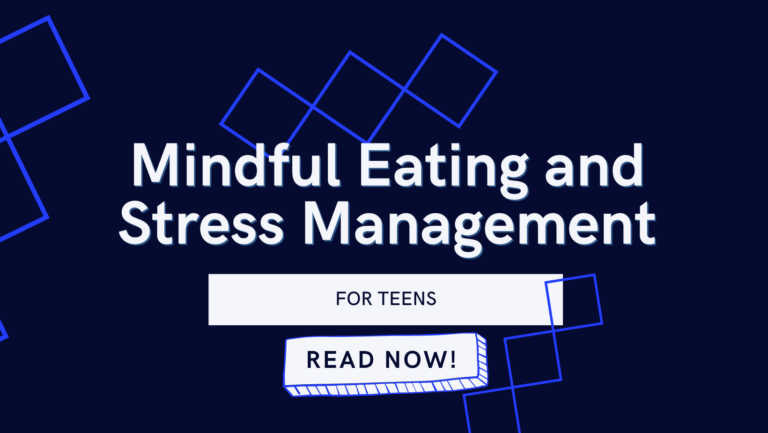Teenagers today face a multitude of stressors, from academic pressures to social challenges. These stressors can significantly impact their eating habits, often leading to emotional eating and an unhealthy relationship with food. In this comprehensive guide, we will address the relationship between stress and eating habits among teenagers, provide stress management techniques, and highlight the benefits of mindful eating. All information is supported by references from the NHS, ensuring accuracy and reliability.
Stress and Eating Habits
Stress Eating: Teenagers often turn to food as a coping mechanism when they are stressed or overwhelmed. This can lead to overeating and unhealthy food choices, which provide temporary comfort but do not address the underlying stressors.
Emotional Eating: Emotional eating occurs when emotions, such as sadness, boredom, or anxiety, trigger the desire to eat. Teenagers may consume high-calorie, sugary, or fatty foods to soothe their emotions, which can lead to weight gain and health issues.
Stress Management Techniques
Teaching teenagers effective stress management techniques is crucial for their overall well-being. Here are some strategies they can incorporate into their daily lives:
1. Mindfulness and Meditation:
- Encourage teenagers to practice mindfulness and meditation to reduce stress and increase self-awareness. These techniques can help them stay present in the moment and prevent impulsive eating.
2. Physical Activity:
- Regular exercise is an excellent way to manage stress. It releases endorphins, which are natural mood lifters. Encourage teens to engage in physical activities they enjoy, whether it’s dancing, jogging, or yoga.
3. Healthy Coping Mechanisms:
- Teach teens alternative ways to cope with stress, such as journaling, drawing, or talking to a trusted friend or family member. These activities can replace the urge to eat when stressed.
4. Time Management:
- Help teenagers develop effective time management skills to reduce academic stress. Proper planning and organization can prevent last-minute cramming and the associated stress.
5. Healthy Sleep Habits:
- Emphasize the importance of quality sleep for stress reduction. Teens should aim for 8-10 hours of sleep per night to support their physical and emotional well-being.
Benefits of Mindful Eating
Mindful eating is a practice that encourages individuals to pay full attention to their eating experience. It involves being present during meals, savoring each bite, and listening to hunger and fullness cues. The benefits of mindful eating for teenagers include:
1. Improved Digestion:
- Mindful eating can lead to better digestion as it allows the body to fully engage with the eating process, optimizing nutrient absorption.
2. Healthy Weight Management:
- By being mindful of portion sizes and eating only when hungry, teenagers can prevent overeating and maintain a healthy weight.
3. Enhanced Body Awareness:
- Mindful eating helps teens become more attuned to their bodies’ hunger and fullness signals, promoting a healthier relationship with food.
4. Emotional Regulation:
- Mindful eating can help teenagers differentiate between physical hunger and emotional hunger, reducing the likelihood of stress-induced emotional eating.
NHS Guidelines
As per the NHS guidelines, teenagers need to adopt healthy stress management techniques and mindful eating practices to maintain their overall well-being. Here’s a table summarizing these recommendations:
| Stress Management Techniques | Benefits of Mindful Eating |
| – Mindfulness and Meditation | – Improved Digestion |
| – Physical Activity | – Healthy Weight Management |
| – Healthy Coping Mechanisms | – Enhanced Body Awareness |
| – Time Management | – Emotional Regulation |
| – Healthy Sleep Habits |
By combining stress management techniques with mindful eating, teenagers can establish a healthier relationship with food, manage stress more effectively, and ultimately enhance their overall quality of life.
Conclusion
In conclusion, stress and eating habits are interconnected for teenagers, often leading to emotional eating and an unhealthy relationship with food. However, by implementing stress management techniques and adopting mindful eating practices, teenagers can break this cycle, improve their digestion, maintain a healthy weight, and gain better control over their emotional eating tendencies. Encouraging these habits can set them on a path to lifelong well-being and a positive relationship with food.






